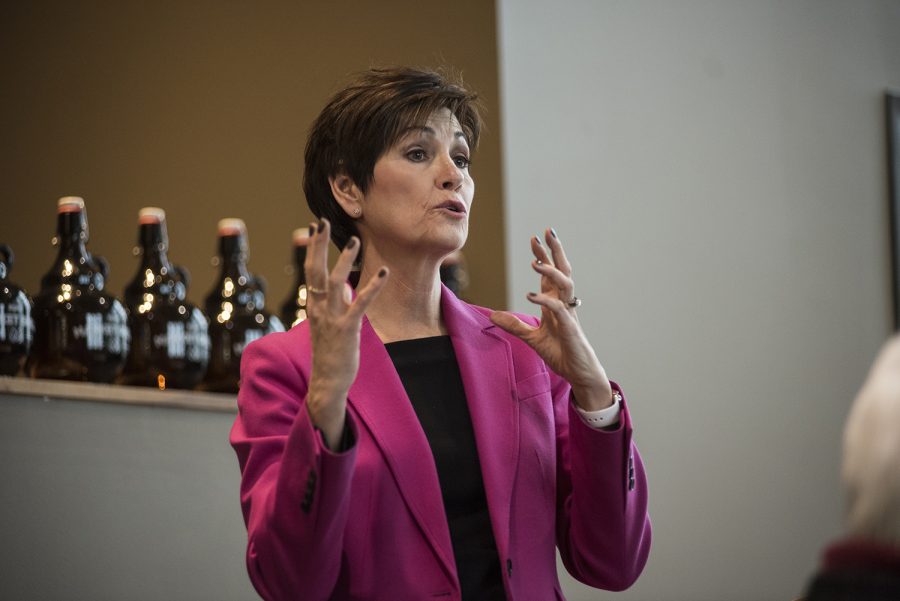How Midwest flooding became a political wedge
A state aid package is being crafted for Midwest disaster relief in the Iowa Legislature, but a federal disaster-relief package has stalled in Congress.
Kim Reynolds talks at Hy-Vee in Coralville during her 99 Counties tour on Thursday, April 5, 2018.
April 15, 2019
Members of Congress and the Iowa Legislature are at political crossroads over how government aid should be dispensed to victims of Midwest flooding and whether the flooding was caused by climate change.
While a federal aid package has stalled in Congress, Iowa Gov. Kim Reynolds announced a $15 million legislative funding package on Monday for this fiscal year to immediately address flood damage to infrastructure in western Iowa.
“The legislation spans levees, drainage areas, and flood-control improvements for individuals, businesses, and communities affected by this historic flooding,” Reynolds said in a press conference on Monday.
Iowa Senate Democrats proposed a $50 million plan to address flood damages two weeks ago, but Republicans wanted to wait for Reynolds to deliver more information until the Legislature took action, according to the Des Moines Register.
Although it is yet to be seen if Reynolds’ proposal will gain bipartisan support among legislators, deliberations for an aid package at the federal level have gained limited traction.
An aid package in the U.S. Senate sponsored by Sen. Chuck Grassley, R-Iowa, was voted down by some Senate Democrats on April 1. Grassley, along with Sen. Joni Ernst, R-Iowa, made statements via Twitter condemning senators who voted down the disaster-relief package while campaigning in Iowa ahead of the 2020 presidential race.
RELATED: In Washington, Iowa Democratic and Republican lawmakers find middle ground
U.S. Senate Democrats and 2020 presidential hopefuls, Elizabeth Warren, Cory Booker, Kirsten Gillibrand, and Amy Klobuchar, all voted against a $13.45 billion relief package on April 1, as did independent Bernie Sanders. Democrats opposed the package because it didn’t include direct funds to Puerto Rico in the aftermath of Hurricane Maria from September 2017.
In the lower chamber, all but six U.S. House Republicans similarly voted against a disaster-aid package that passed in January with all Democrats casting yes votes.
Rep. Cindy Axne, D-Iowa, successfully requested in April a supplemental disaster appropriations bill to allocate $3 billion in federal aid for Iowa after the Senate disaster relief bill stalled.
At the state level, Reynolds also asked the Iowa Legislature to approve an additional $10 million for fiscal 2020 for a workforce and housing tax credit that aims to develop flood-affected areas.
A similar effort on the federal level driven by Grassley and Ernst, would give tax relief to flood victims of Iowa and Nebraska. The proposed legislation, sponsored solely by Republicans, would give individuals access to retirement funds and provide tax credits to businesses experiencing employee retention.
Climate change
Whether climate change is a player in the flooding has put a divide in the way some politicians are addressing the issue.
Grassley communications director Michael Zona wrote in an email to The Daily Iowan on March 28 that the flooding was caused by mismanagement of the Missouri River and adverse weather conditions, excluding climate change as a factor. Ernst will chair a committee hearing on Wednesday with the Army Corps of Engineers to examine the management of the river.
Democrats in Congress, such as Rep. Abby Finkenauer, D-Iowa, have challenged the assertion that climate change is not a factor, saying it’s a primary cause of the massive flooding.
RELATED: Climate change, Midwest floods divide politicians
Jerry Schnoor, University of Iowa professor of civil and environmental engineering, said he would put equal blame on the mismanagement of the river and climate change as factors in the severity of the flooding.
“Given the amount and frequency of flooding in the Midwest and Iowa, it would seem to me that [Iowa senators] should be concerned about the possibility that climate change is affecting our weather and our flooding,” Schnoor said.






